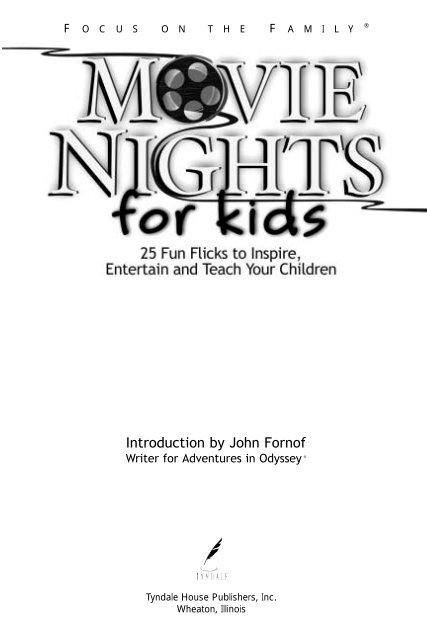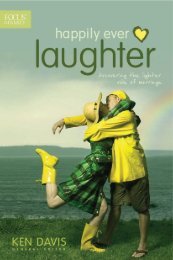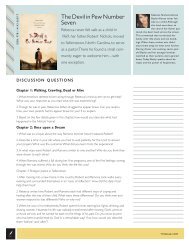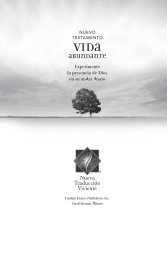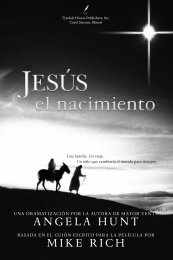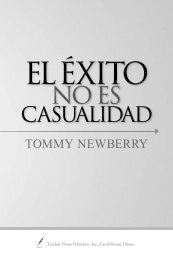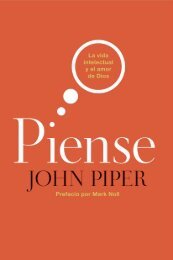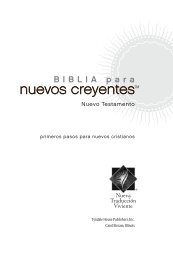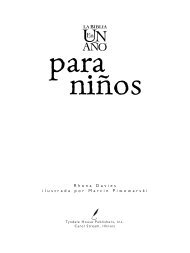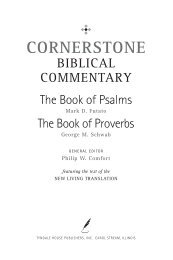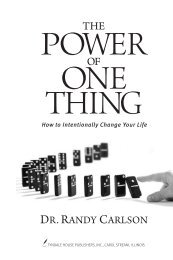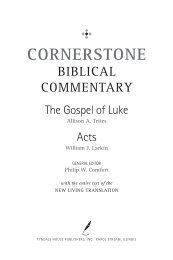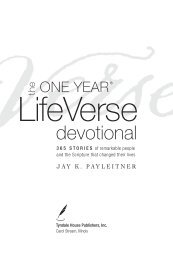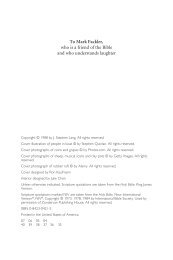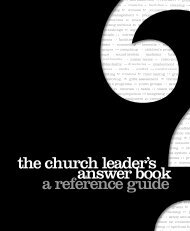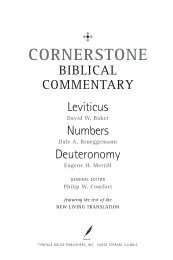Movie Nights for Kids - Tyndale House Publishers
Movie Nights for Kids - Tyndale House Publishers
Movie Nights for Kids - Tyndale House Publishers
Create successful ePaper yourself
Turn your PDF publications into a flip-book with our unique Google optimized e-Paper software.
F O C U S O N T H E F A M I L Y ®<br />
Introduction by John Fornof<br />
Writer <strong>for</strong> Adventures in Odyssey ®<br />
<strong>Tyndale</strong> <strong>House</strong> <strong>Publishers</strong>, Inc.<br />
Wheaton, Illinois
<strong>Movie</strong> <strong>Nights</strong> <strong>for</strong> <strong>Kids</strong><br />
Copyright © 2004 by Focus on the Family<br />
All rights reserved. International copyright secured.<br />
ISBN: 1-58997-214-7<br />
A Focus on the Family book published by<br />
<strong>Tyndale</strong> <strong>House</strong> <strong>Publishers</strong>, Wheaton, Illinois 60189<br />
All Scripture quotations, unless otherwise indicated, are taken from the Holy Bible,<br />
New International Version ® . NIV ® . Copyright © 1973, 1978, 1984 by International<br />
Bible Society. Used by permission of Zondervan Publishing <strong>House</strong>. All rights<br />
reserved.<br />
No part of this publication may be reproduced, stored in a retrieval system, or transmitted<br />
in any <strong>for</strong>m or by any means—electronic, mechanical, photocopy, recording,<br />
or otherwise—without prior permission of Focus on the Family.<br />
Focus on the Family books are available at special quantity discounts when purchased<br />
in bulk by corporations, organizations, churches, or groups. For more in<strong>for</strong>mation,<br />
contact: Focus on the Family, 8605 Explorer Drive, Colorado Springs, CO<br />
80920; or phone (800) 932-9123.<br />
Library of Congress Cataloging-in-Publication Data<br />
<strong>Movie</strong> nights <strong>for</strong> kids : 25 fun flicks to inspire, entertain, and teach your children /<br />
introduction by John Fornof.— 1st ed.<br />
p. cm.<br />
ISBN 1-58997-214-7<br />
1. Motion pictures in Christian education. 2. Christian education—Home training.<br />
3. Christian education of children. I. <strong>Tyndale</strong> <strong>House</strong> <strong>Publishers</strong>.<br />
BV1535.4.M72 2004<br />
248.8'45—dc22<br />
2004009097<br />
Editor: Kathy Davis<br />
Cover Design: Sally Leatherman<br />
Cover Photo: Don Jones Photography<br />
Cover Models: Via Entertainment<br />
Printed in the United States of America<br />
1 2 3 4 5 6 7 8 9 / 10 09 08 07 06 05 04
Contents<br />
Introduction: Getting the Most out of <strong>Movie</strong> <strong>Nights</strong> . . . . . . . . . . . . . . . . .1<br />
The <strong>Movie</strong>s:<br />
Anne of Green Gables . . . . . . . . . . . . . . . . . . . . . . . . . . . . . . . . . . . . . . .7<br />
Babe . . . . . . . . . . . . . . . . . . . . . . . . . . . . . . . . . . . . . . . . . . . . . . . . . . . . .15<br />
The Black Stallion . . . . . . . . . . . . . . . . . . . . . . . . . . . . . . . . . . . . . . . . . .21<br />
Charlotte’s Web . . . . . . . . . . . . . . . . . . . . . . . . . . . . . . . . . . . . . . . . . . . .27<br />
Chicken Run . . . . . . . . . . . . . . . . . . . . . . . . . . . . . . . . . . . . . . . . . . . . . .33<br />
Finding Nemo . . . . . . . . . . . . . . . . . . . . . . . . . . . . . . . . . . . . . . . . . . . . .39<br />
Homeward Bound: The Incredible Journey . . . . . . . . . . . . . . . . . . . .45<br />
Ice Age . . . . . . . . . . . . . . . . . . . . . . . . . . . . . . . . . . . . . . . . . . . . . . . . . . .51<br />
Iron Will . . . . . . . . . . . . . . . . . . . . . . . . . . . . . . . . . . . . . . . . . . . . . . . . . .57<br />
Jimmy Neutron: Boy Genius . . . . . . . . . . . . . . . . . . . . . . . . . . . . . . . . .63<br />
The Lion, the Witch and the Wardrobe . . . . . . . . . . . . . . . . . . . . . . . .69<br />
Little Secrets . . . . . . . . . . . . . . . . . . . . . . . . . . . . . . . . . . . . . . . . . . . . . .75<br />
Miracle on 34th Street . . . . . . . . . . . . . . . . . . . . . . . . . . . . . . . . . . . . . .81<br />
National Velvet . . . . . . . . . . . . . . . . . . . . . . . . . . . . . . . . . . . . . . . . . . . .87<br />
Old Yeller . . . . . . . . . . . . . . . . . . . . . . . . . . . . . . . . . . . . . . . . . . . . . . . . .93<br />
The Rookie . . . . . . . . . . . . . . . . . . . . . . . . . . . . . . . . . . . . . . . . . . . . . . . .99<br />
Sarah, Plain and Tall . . . . . . . . . . . . . . . . . . . . . . . . . . . . . . . . . . . . . . .105<br />
The Sound of Music . . . . . . . . . . . . . . . . . . . . . . . . . . . . . . . . . . . . . . .111<br />
Spy <strong>Kids</strong> . . . . . . . . . . . . . . . . . . . . . . . . . . . . . . . . . . . . . . . . . . . . . . . . .117<br />
Stuart Little 2 . . . . . . . . . . . . . . . . . . . . . . . . . . . . . . . . . . . . . . . . . . . . .123<br />
Swiss Family Robinson . . . . . . . . . . . . . . . . . . . . . . . . . . . . . . . . . . . .129<br />
Tarzan . . . . . . . . . . . . . . . . . . . . . . . . . . . . . . . . . . . . . . . . . . . . . . . . . . .135<br />
Toy Story 2 . . . . . . . . . . . . . . . . . . . . . . . . . . . . . . . . . . . . . . . . . . . . . . .141<br />
Treasure Planet . . . . . . . . . . . . . . . . . . . . . . . . . . . . . . . . . . . . . . . . . . .147<br />
The Wizard of Oz . . . . . . . . . . . . . . . . . . . . . . . . . . . . . . . . . . . . . . . . . .153
Introduction<br />
Getting the Most out<br />
of <strong>Movie</strong> <strong>Nights</strong><br />
What’s wrong with me? What’s with the tears? Good grief, it’s only a movie.<br />
Worse yet, it’s a cartoon!<br />
Okay, I’ve done it now. I’ve admitted that I teared up while watching<br />
Toy Story 2. Go ahead and do that little chuckle thing. But what did you do<br />
when you heard the song of Jessie, the cowgirl doll? The little girl who<br />
once loved Jessie has grown up now. She’s filled her life with teenage<br />
things, and there’s no longer a place <strong>for</strong> the favorite little cowgirl she used<br />
to play with. Jessie is dumped into a cardboard box labeled “Yard Sale,”<br />
her once bright eyes now questioning, as the grown-up girl drives away<br />
<strong>for</strong> good.<br />
My kids were oblivious to my blubbering as I listened to Jessie sing<br />
her song. Maybe that’s a good thing. But I was impressed by something:<br />
the power of movies to move us. When a movie is done right, it’s a moving<br />
picture.<br />
Think about it—why do you enjoy watching movies? I think the<br />
enjoyment comes from what we take home with us. <strong>Movie</strong>s at their best<br />
give us insight into our own lives. <strong>Movie</strong>s magnify life. The big screen<br />
beckons us to leave small thinking, to live life large.<br />
Does your child think like this as he munches on M&Ms, his eyes fixated<br />
on the screen? Probably not. That’s why you and I as parents read books like<br />
<strong>Movie</strong> <strong>Nights</strong> <strong>for</strong> <strong>Kids</strong>. We want our kids to learn to think critically about<br />
what they view, while they enjoy a good story with some take-away value.<br />
1
MOVIE NIGHTS FOR KIDS<br />
We also want our kids to experience the fun and fascination of good<br />
films, without exposing them to the grunge and grime of moral decay<br />
that’s so prevalent in today’s entertainment. Do you ever feel like I do,<br />
though—like Hollywood is out of touch with parents’ values and concerns?<br />
How else do you explain a movie like The Cat in the Hat that’s targeted<br />
<strong>for</strong> kids, but filled with sexual innuendo? What were these people<br />
thinking?<br />
And yet, when Hollywood does it right we parents line up and buy in<br />
the millions. We’re looking <strong>for</strong> movies that reaffirm our values, not ridicule<br />
them. We’re looking <strong>for</strong> a tour guide through the land mines. That’s what<br />
this book is about.<br />
Take a look through the list of movies we’ve included <strong>for</strong> you. We can’t<br />
guarantee moral perfection here. But we can tell you that each movie on<br />
this list is an enjoyable family film with a strong moral compass.<br />
And the best part: For each film, we give you fun and thought-provoking<br />
ways to connect with your kids and build some memories as you experience<br />
the movie together. In each review, you’ll find:<br />
Themes: We zero in on the moral heart of the movie.<br />
Cautions: We give you “red flags” about any questionable content.<br />
(We also recommend that you preview each movie be<strong>for</strong>e showing it to<br />
your child.)<br />
Talking Points: Use these questions to spark a meaningful dialogue<br />
with your child.<br />
Bible Bookmarks: Discover what God has to say about the movie’s<br />
themes.<br />
Follow-Up Activities: These are fun ideas to help your kids relate to<br />
the moral message of the movie—everything from creating a maze to<br />
helping them craft their own “stained glass” windows to taking a field trip<br />
to a riding stable.<br />
Some Thoughts About a Family <strong>Movie</strong> Night<br />
When Jesus wanted to make a point, He told stories. A party-animal son<br />
returns home to his dad. An anxious investor buries his client’s money. A<br />
man rescued from debtors’ prison throttles his friend who owes him two<br />
bits. These are stories we remember, stories of <strong>for</strong>giveness, fear,<br />
hypocrisy.<br />
The same is true today. Jesus still talks to us through stories. And if<br />
we’re listening to Him, we’ll gain insight as we watch. <strong>Movie</strong> <strong>Nights</strong> <strong>for</strong><br />
2
<strong>Kids</strong> isn’t about preaching to your offspring. It’s about discovering truths<br />
together. Finding Nemo is a good example. <strong>Kids</strong> can witness the dire consequences<br />
of disobedience. But we parents can pick up an important<br />
truth as well: Being overprotective can suffocate our children’s growth.<br />
We encourage you to pray be<strong>for</strong>e you watch each of these movies.<br />
That may sound strange. But try it. Ask God to teach you and your family<br />
His truth. You may start enjoying movies on an entirely new level.<br />
And there’s nothing like the closeness of your family cuddled up on the<br />
sofa with some pretzels or popcorn, watching a movie together. Now, with<br />
<strong>Movie</strong> <strong>Nights</strong> <strong>for</strong> <strong>Kids</strong>, you can also engage with your kids afterward. Learn<br />
what’s going on inside their heads and hearts. Share with them what you’re<br />
learning. And guide them in a way that inspires them to impact their culture<br />
(in the world) without being corrupted by it (not of the world).<br />
Some Cautions<br />
Take note of our “Cautions” section. To be <strong>for</strong>ewarned is to be fast-<strong>for</strong>warded.<br />
Generally, you’ll find that the TV version of a movie filters out most profanity.<br />
But if you rent or buy prerecorded movies, an alternative is a filtering<br />
device that automatically blocks most of the bad words. However,<br />
while we’ve tried to select movies that have no profanities and questionable<br />
content, sometimes very worthy stories have a few. If your family<br />
finds these unacceptable, then skip the movies that have them. We don’t<br />
encourage anyone to violate his or her family’s standards.<br />
Keep in mind your child’s maturity and sensitivity level as well. Some<br />
kids take certain scenes—such as a parent dying—in stride, while others<br />
may be traumatized by the same scene. That’s another good reason to preview<br />
and pray be<strong>for</strong>e you watch—and pray about whether you should<br />
watch.<br />
Don’t Overdo It<br />
We’ve given you several talking points and activities <strong>for</strong> most of the<br />
movies because we know that your kids will want to watch certain<br />
favorites over and over. You don’t have to discuss all the talking points in<br />
one sitting. You may want to reserve some <strong>for</strong> another movie night, or<br />
strike up a casual conversation later in the week at the dinner table or in<br />
the car. Feel free to choose the activities that are most suited to your children’s<br />
ages, maturity levels, and interests. Above all, a movie night should<br />
be fun!<br />
3<br />
INTRODUCTION
MOVIE NIGHTS FOR KIDS<br />
The Heart of <strong>Movie</strong> <strong>Nights</strong> <strong>for</strong> <strong>Kids</strong><br />
As parents, our white-haired friends tell us that the time we have to raise<br />
our children will pass be<strong>for</strong>e we know it. All too soon, our kids will be<br />
packing their bags and hugging us good-bye as they head off to college<br />
and adulthood.<br />
Maybe this is the pang we feel as we watch Jessie the cowgirl sing. We<br />
know the wide-eyed wonder of our little girl or boy will one day fade, and<br />
all we’ll be left with is the memory of how we invested our time with them.<br />
So let’s make the most of these days with our kids. Take them to the<br />
park and swing on the swings with them, enjoy an ice cream cone<br />
together, go on a nature hike and discover God’s handiwork. And when it<br />
comes to cuddle-time on the couch watching a movie, let’s make the most<br />
of this time as well. With <strong>Movie</strong> <strong>Nights</strong> <strong>for</strong> <strong>Kids</strong> as a guide, gather the<br />
family, grab a snack, pop in the DVD, and let’s make some memories<br />
together.<br />
—John Fornof, writer <strong>for</strong> Adventures in Odyssey and Ribbits!<br />
4
THE MOVIES
Anne of Green<br />
Gables<br />
Rated: G<br />
Themes: Friendship, loyalty, <strong>for</strong>giveness, growth, value of family (even<br />
nontraditional family), acceptance<br />
Running Time: 3 hours, 15 minutes (can be watched in two parts)<br />
Starring: Megan Follows as Anne Shirley, Colleen Dewhurst as Marilla<br />
Cuthbert, Richard Farnsworth as Matthew Cuthbert, Patricia Hamilton<br />
as Rachel Lynde, Schuyler Grant as Diana Barry, and Jonathan Crombie<br />
as Gilbert Blythe<br />
Directed by: Kevin Sullivan<br />
¡<br />
Cautions<br />
Anne is a normal girl who gets herself into lots of trouble, yet<br />
each incident is handled appropriately by her caretakers. In<br />
one scene, Diana accidentally gets drunk on some mild wine, thinking it<br />
is the cordial that Marilla gave the girls permission to drink.<br />
+<br />
Story Summary<br />
If you haven’t yet met Anne Shirley, then now is the time!<br />
Anne is a delightful young orphan who can get herself (and others) into<br />
trouble without even trying. She constantly makes mistakes, yet she is<br />
lovable, kind, deeply loyal, and great fun. Her prodigious imagination is<br />
a source of both laughter and calamity.<br />
7<br />
DRAMA
MOVIE NIGHTS FOR KIDS<br />
Part 1<br />
This three-hour story begins with 12-year-old Anne walking through the<br />
<strong>for</strong>est, reading her favorite Tennyson poem, “The Lady of Shalott.”<br />
Because she is so involved in the story, she is late returning from her<br />
errands and is harshly punished by the woman <strong>for</strong> whom she works.<br />
Anne lives with a family, working as a caretaker <strong>for</strong> their three sets of<br />
twins. When the woman’s husband dies, Anne is once<br />
again placed in an orphanage. But soon, through a<br />
mistake, she is sent to live on Prince Edward<br />
Island with an elderly brother and sister,<br />
Matthew and Marilla Cuthbert. The Cuthberts<br />
decide that, although they wanted<br />
a boy to help Matthew with the farm<br />
work, they will keep Anne <strong>for</strong> a probationary<br />
period. Anne, with her<br />
ability to get into trouble,<br />
immediately is involved in<br />
several situations that<br />
could convince the<br />
Cuthberts to ship her<br />
off to the horrible Mrs.<br />
Blewett (who also has twins),<br />
or back to the orphanage. But<br />
Anne has a tendency to weasel her<br />
way into people’s hearts, and she so desperately<br />
wants a family of her own that<br />
Matthew and Marilla decide to keep her.<br />
Anne is immediately thrust into the pastoral<br />
life of Avonlea, finding a world she’s never experienced.<br />
She is introduced to the sweet, naïve Diana Barry at a picnic and<br />
they become instant friends. Diana never seems to do anything wrong,<br />
while Anne’s quick temper and her sharp eye <strong>for</strong> justice cause her to overreact<br />
and get into trouble.<br />
Anne is enrolled in school, where she excels in all subjects but continually<br />
butts heads with a boy named Gilbert Blythe who started off on the<br />
wrong foot by calling her “Carrots” the first day of school. Gilbert could<br />
not have called her anything more galling, <strong>for</strong> she detests her red hair.<br />
Anne has a fierce desire to succeed in life and studies hard to be at<br />
8
9<br />
ANNE OF GREEN GABLES<br />
the top of her class. She has to battle a teacher who doesn’t see value in<br />
anyone except his favorite student, Prissy Andrews, and is played by Jose<br />
Pye, a snotty girl who looks down on Anne because she’s jealous that<br />
Gilbert gives the lowly orphan his attention.<br />
Though at first Anne is on probation with Marilla and Matthew, she<br />
is soon part of the family. Still, she is falsely accused of stealing, tries to<br />
dye her hated red hair black, hurts her ankle when she falls off a roof<br />
while showing off, and then hurts her other ankle falling into an abandoned<br />
well.<br />
Anne tries to do well as she grows up, and in the final scenes of part<br />
1, she is excited to be serving tea to Diana while Marilla leaves them to<br />
act like grown-ups. Marilla tells Anne that she is allowed to serve the<br />
prized raspberry cordial to her guest. Anne searches <strong>for</strong> the bottle, but<br />
not really knowing what she’s looking <strong>for</strong>, retrieves the wrong bottle. She<br />
serves Diana, then retreats to the kitchen to finish the preparations <strong>for</strong><br />
tea. Diana downs nearly the entire bottle, becoming more giggly and<br />
tipsy with each glass. By the time Anne is ready to serve the food, Diana<br />
is so nauseated she only wants to go home. Anne helps her get home,<br />
where Diana’s mom is horrified to find her daughter drunk and sick. She<br />
blames Anne <strong>for</strong> doing it on purpose. Anne is clueless, not really knowing<br />
what’s wrong with Diana. Part 1 ends with Mrs. Barry <strong>for</strong>bidding<br />
Anne to ever speak with Diana again.<br />
Part 2<br />
Anne is sad and lonely, watching Diana Barry from a distance. Diana is<br />
obviously sad as well. The only bright spot in Anne’s life is her new<br />
teacher, Miss Stacey. Miss Stacey is an encourager and believes in all the<br />
children, giving them educational experiences outside the classroom<br />
and preparing them <strong>for</strong> college and life beyond school. She and Anne<br />
develop a special friendship.<br />
One winter night, long after Diana and Anne have been <strong>for</strong>ced to<br />
part as friends, Diana races to Green Gables because her younger sister<br />
is terribly sick with the croup. Diana’s parents have gone to a political<br />
rally, leaving her in charge, but she has no idea how to help her sister.<br />
Fortunately, Anne has dealt with the croup many times with the twins<br />
she used to care <strong>for</strong>, and she knows exactly what to do. When the doctor<br />
finally arrives, the fever has broken, and the little girl is breathing fine
MOVIE NIGHTS FOR KIDS<br />
again. The doctor commends Anne <strong>for</strong> saving the child’s life.<br />
As a result, Mrs. Barry regrets her earlier decision and not only allows<br />
Anne and Diana to be friends again, but also invites Anne to a ball. At<br />
first, Marilla won’t let her go, angry that Mrs. Barry would accuse Anne of<br />
purposely getting Diana drunk. But Matthew steps in and convinces<br />
Marilla that the ball would be good <strong>for</strong> Anne. He also buys Anne her<br />
dream dress—one with puffed sleeves.<br />
At the ball, Anne’s un<strong>for</strong>giving attitude toward Gilbert is evident. For<br />
a moment, at Diana’s encouragement, she thinks about making up with<br />
Gilbert. But then he responds rudely to her, and she returns to her angry<br />
cave of un<strong>for</strong>giveness.<br />
That night, she and Diana are thrilled that they get to sleep in the<br />
guest bedroom. They race to the room and leap onto the bed—surprising<br />
and scaring Aunt Josephine half to death. The girls knew Aunt<br />
Josephine was coming to visit, but they thought she was not going to be<br />
there until the following night. Aunt Josephine is convinced that they<br />
scared her on purpose.<br />
The next morning, however, Anne disarmingly apologizes to Aunt<br />
Josephine, and they become friends. Anne says later to Diana, “She is a<br />
kindred spirit.” Aunt Josephine’s entrance into Anne’s life adds a new<br />
dimension to the girl’s future. Now Anne has someone else who cares<br />
about her, and she has an older woman friend to spend time with and<br />
confide in.<br />
Back home, Anne’s imagination gets her into trouble again as she plays<br />
out her favorite poem, “The Lady of Shalott.” The skiff she is floating in<br />
sinks, and she has to cling to a bridge until Gilbert Blythe comes along.<br />
She’s humiliated and angry that he should be the one to rescue her.<br />
Anne grows up quickly, per<strong>for</strong>ming an epic poem at the White Sands<br />
Hotel, winning the Avery Scholarship, and getting ready to go to college.<br />
Matthew and Marilla are very proud of her accomplishments. She is<br />
eager to continue her education, but Matthew dies suddenly, leaving<br />
Green Gables in a precarious position. Anne decides to <strong>for</strong>go college to<br />
teach in a neighboring community’s school. Gilbert is to teach at the<br />
Avonlea school because of his family’s situation. Yet, with extreme kindness<br />
and sacrifice, Gilbert trades teaching positions with Anne so she<br />
can be close to Green Gables and Marilla.<br />
Marilla confesses to Anne that as a young person she’d had an un<strong>for</strong>giving<br />
attitude toward Gilbert’s father and thought she could punish<br />
10
3<br />
him by not <strong>for</strong>giving him. Yet now she realizes that was foolish<br />
and wrong, and she tells Anne she wishes she’d <strong>for</strong>given<br />
him years be<strong>for</strong>e. Anne decides to <strong>for</strong>give Gilbert, and the<br />
story ends with a hint of potential romance (finally!) between the two.<br />
Be<strong>for</strong>e You Watch<br />
Get out an atlas and find Prince Edward Island. Go to the library, or<br />
search the Internet to find out more about PEI, its history and customs.<br />
Talk about how things have changed in the last hundred years or so.<br />
Have your children call their grandparents and ask them what things<br />
have changed since they were young. What did you (parents) have as<br />
children that no longer exists? (Wax paper bags <strong>for</strong> sandwiches! Vinyl<br />
records!) Or what new things have been invented since you<br />
were a child? Remind your children to watch <strong>for</strong> things in the<br />
movie that are different from today.<br />
k<br />
m<br />
Bible Bookmarks<br />
Proverbs 17:17; Ecclesiastes 4:9-10; Luke 6:37; Ephesians<br />
4:32; Matthew 18:21-22<br />
Talking Points, Part 1<br />
1. Would you like a friend like Anne Shirley? Why or why not? What do<br />
you like most about her? What don’t you like about her? Read Proverbs<br />
17:17. Does this verse describe Anne? How? Does it describe anyone you<br />
know?<br />
2. Anne hates the color of her hair. What do you think about her hair?<br />
If you could change anything about yourself, what would it be? Why?<br />
3. Marilla says Anne’s first prayer sounds like she’s writing a business<br />
letter to God. Who do you think God is like when you pray? A boss? A<br />
policeman? A friend? A parent? A wish catalog to order from?<br />
4. Anne apologized to Rachel Lynde. Did she really mean it? Was she<br />
really sorry? What was she sorry <strong>for</strong>? Is an apology really an apology if<br />
you don’t mean it? Explain.<br />
5. Read Luke 6:37. Throughout the first half of the story, Anne is<br />
judged <strong>for</strong> being an orphan. People assume she will have bad manners<br />
11<br />
ANNE OF GREEN GABLES
MOVIE NIGHTS FOR KIDS<br />
and do bad things just because she doesn’t have parents. Is that right<br />
according to the verse you just read? What are some of the things<br />
people think Anne did that she really didn’t do? Have you ever thought<br />
someone at school would have bad manners and do bad things just<br />
because they looked a certain way or had a different kind of family than<br />
you’re used to?<br />
6. Whose fault do you think it is that Diana drank too<br />
much of the wine and got sick? Why? Is there ever a situation<br />
when something happens that is no one’s fault?<br />
m<br />
Talking Points, Part 2<br />
1. Miss Stacey says to Anne, “The truth will set you free.” Do you think<br />
this statement is correct? What about lying? Does that get you out of<br />
trouble? How can lying do the opposite of setting you free? Find the<br />
verse in the Bible where Jesus says, “Then you will know the truth, and<br />
the truth will set you free” (John 8:32).<br />
2. “Tomorrow is always fresh, without any mistakes in it.” What do<br />
you think of that statement? Does it make you excited or scared? Why?<br />
Have you ever had a day when you didn’t sin or make any mistakes?<br />
(Everyone be honest!)<br />
3. Which teacher do you like better? Mr. Phillips or Miss Stacey?<br />
Why? Is Mr. Phillips fair to Anne?<br />
4. Anne studies hard to be at the top of her class. In this story, can<br />
you see how working and studying hard bring good things to Anne?<br />
What are those things? After watching this movie, how do you feel about<br />
working hard in school?<br />
5. Anne gets mad at Gilbert Blythe at the very beginning of the story.<br />
Do you remember why? Throughout the story Anne refuses to <strong>for</strong>give<br />
Gilbert and holds a grudge (she stays mad). Do you think Gilbert<br />
deserves <strong>for</strong> her to hold a grudge <strong>for</strong> so many years over that one little<br />
thing? How long do you think someone should hold a grudge? Have you<br />
ever held a grudge when someone hurt you? How did that feel to hold<br />
the grudge? What does God say we are to do? See Matthew 18:21-22 and<br />
6:14-15. How hard is that?<br />
e<br />
Follow-Up Activities<br />
12
13<br />
ANNE OF GREEN GABLES<br />
No TV Zone<br />
Make a list of things Anne and her friends and family do to entertain<br />
themselves since they don’t have television. From your list, choose five<br />
new things to try, and do one a week <strong>for</strong> the next five weeks. Then talk<br />
about which of those activities were the most fun and which ones you’d<br />
like to do again. Make a “suggestion box” so the family can submit ideas<br />
<strong>for</strong> fun things they’d like to do in the future. Once in a while take out a<br />
suggestion and do it as a family. Remember, most of Anne’s activities<br />
don’t cost anything, and some involve friends.<br />
Family Reading Time<br />
If you don’t already own Anne of Green Gables by Lucy Maud Montgomery,<br />
check it out of the library and read aloud from the book each<br />
night after dinner or at bedtime. Follow Anne through the rest of the<br />
books in the series. You’ll be glad you did!<br />
—Lissa Halls Johnson
Babe<br />
Rated: G<br />
Themes: Intrinsic value of life, courage, importance of friendship, treating<br />
others different from you with respect, the power of love and kindness<br />
to change things, the value of individuals who do not have special<br />
talents but have love, acceptance, kindness, and innocence<br />
Running Time: 1 hour, 32 minutes<br />
Starring: James Cromwell as Farmer Hoggett, Magda Szubanski as Mrs.<br />
Hoggett, and the voice talents of Christine Cavanaugh as Babe, Miriam<br />
Margolys as Fly, and Hugo Weaving as Rex<br />
Directed by: Chris Noonan<br />
¡<br />
Cautions<br />
There is some mild language: Babe calls the sheep buttheads;<br />
the son-in-law says “<strong>for</strong> God’s sake.” A duck is killed off camera<br />
<strong>for</strong> the family Christmas dinner. The fact that the meat we eat was once a<br />
living animal is made clear when Babe asks if humans eat pigs. The<br />
grandchildren are brats, rudely refusing to eat their Christmas dinner and<br />
throwing fits when they don’t like the Christmas gifts they receive.<br />
Story Summary<br />
+ Right away, it’s obvious this pig is different from the others.<br />
When his mother is taken away, he mourns <strong>for</strong> her while his<br />
sisters and brothers are more interested in food. Babe is swept out of the<br />
barn and taken to a small country fair where Farmer Hoggett correctly<br />
guesses Babe’s weight and wins him. The plan from the beginning is to<br />
fatten Babe and eat him. Yet although Farmer Hoggett doesn’t know it<br />
right away, he senses that Babe is special.<br />
15<br />
DRAMA
MOVIE NIGHTS FOR KIDS<br />
In the farmyard it’s immediately clear that the other animals have<br />
prejudices against each other based on the type of animal they are. The<br />
dogs believe all sheep and pigs are stupid. The sheep believe all dogs are<br />
vicious wolves. Everyone believes something about the other animals<br />
that keeps everyone segregated in their own little groups, suspicious and<br />
unable to get along. And Ferdinand the duck doesn’t want to be who he<br />
is—he’d rather be a rooster.<br />
Babe is the only animal without prejudice. He believes the best of all<br />
creatures. His heart is large, kind, innocent, and loving. Because it is so,<br />
he is taken advantage of by the duck, is loved by the sheep, and eventually<br />
changes the lives of everyone he comes in contact with—not<br />
because he has super talents in one <strong>for</strong>m or another, but simply because<br />
he loves others and is kind to them.<br />
Babe is accepted by the animals until he mistakenly follows the devious<br />
duck in an attempt to steal an alarm clock.<br />
Babe is only trying to help the duck, not realizing<br />
he’s being used. As a result, Babe is nearly banished<br />
from the barnyard family. He’s not<br />
allowed to “consort” with the duck anymore.<br />
When he first arrived on the<br />
farm, Fly, one of the main sheepdogs,<br />
took Babe into her litter.<br />
When it’s time <strong>for</strong> her puppies<br />
to leave home, she is<br />
sad until Babe asks, “Fly,<br />
may I call you Mom?”<br />
From that day, Fly<br />
takes the little pig even<br />
more to heart and becomes<br />
his protector and guide.<br />
One day, Babe wanders from<br />
the farm and discovers poachers<br />
stealing Farmer Hoggett’s sheep. He races<br />
back to the farm, sounding an alarm that<br />
saves the rest of the sheep. As a result of that<br />
and another small incident, Farmer Hoggett begins<br />
to take Babe with him out to the fields believing Babe might be able to<br />
16
help him herd the sheep. He discovers he is correct, and Babe does a<br />
marvelous job. Babe does not herd the sheep through intimidation but<br />
through kindness and speaking gently to them.<br />
Farmer Hoggett continues to train Babe and enters him in a sheepherding<br />
contest—the Grand Nationals. Rex, one of the sheepdogs, is<br />
jealous of Babe and attempts to destroy him. The cat tells Babe the only<br />
reason he’s alive is so the “bosses” can eat him. Babe asks Fly if this is<br />
true, and she says that yes, people do eat pigs—even the bosses. Hearing<br />
this, Babe runs away. When Farmer Hoggett finds him, the pig is sick.<br />
Rex, having a change of heart toward Babe, tells him to pull himself<br />
together—the boss needs him. Babe gets well just in time <strong>for</strong> the Grand<br />
Nationals. When the judges find out Farmer Hoggett’s sheepdog is really<br />
a pig, they try to bar them from competing. Finally, Farmer Hoggett convinces<br />
the judges to let them compete because the official rule book<br />
does not specifically bar other animals from competition. Out on the<br />
field, others laugh at Farmer Hoggett and Babe, but they move <strong>for</strong>ward,<br />
ignoring the ridicule of the crowd. Despite what everyone<br />
else thinks, they stand true, strong, and courageous.<br />
3<br />
Be<strong>for</strong>e You Watch<br />
Discuss where our meat comes from. Talk about what<br />
prejudice is.<br />
k<br />
m<br />
Bible Bookmarks<br />
Acts 10:34-35; Galatians 5:22; Colossians 3:12; Matthew<br />
22:39; John 15:12<br />
Talking Points<br />
1. What do the animals think about each other? Are they right? Do other<br />
kids do, wear, or say something that makes you or others label them as<br />
“stupid”? What other labels do kids give each other? Are those labels fair?<br />
What does God say about judging others? (See Matthew 7:1; Romans<br />
14:10.)<br />
2. When Fly’s puppies leave home, she is very sad. But Babe asks her<br />
if he may call her “Mom” and she agrees. From then on, Fly protects and<br />
17<br />
BABE
MOVIE NIGHTS FOR KIDS<br />
guides Babe. Who protects and guides you? Name some people you want<br />
to be like. Why do you want to be like them?<br />
3. After Babe is “warned” that the dogs are really just mean wolves<br />
then experiences the kindness of the dog Fly, he says, “I will never think<br />
badly of any creature ever again.” But the duck, Ferdinand, is a bad<br />
influence, leading Babe to do wrong things. What is the difference<br />
between thinking badly of someone (judging them unfairly) and being<br />
wise about whom we trust? Should we trust just anyone?<br />
4. What makes Farmer Hoggett different from the other humans in<br />
the movie? Than the other animals? (One hint: He sees value in Babe.)<br />
How does he treat others (animals and humans) around him? He doesn’t<br />
say much, does he? But what is it like when he does talk? Do you believe<br />
him more or less than his talkative wife?<br />
5. The cat tells Babe all the other animals are laughing at him. That<br />
hurts Babe. When Farmer Hoggett and Babe go to the sheepherding contest,<br />
all the people laugh and laugh. Farmer Hoggett and Babe continue<br />
anyway. What does it take to do what is right even when people are<br />
laughing at you? Can you think of a time when people laughed at you?<br />
What did you do?<br />
6. How is this story like Charlotte’s Web (if you’ve seen that<br />
movie)? How is it different? How is Charlotte like Fly? (Both<br />
are encouraging and kind.)<br />
e<br />
Follow-Up Activities<br />
Noah’s Ark Diorama<br />
Read the story of Noah and the ark (Genesis 6-8) from a children’s Bible<br />
or a storybook. If you’ve done the Train Ride activity from Sarah, Plain &<br />
Tall, have your kids create a diorama of the Noah’s ark story using the<br />
box. (If not, follow the instructions to make the box <strong>for</strong> the diorama.)<br />
When illustrating the story, start with the building of the ark, then move<br />
to the gathering of the animals, the flood, and finally the resettlement of<br />
the earth by Noah’s family and the animals. Ask your kids, “Why do you<br />
think God included all the animals? Are all of them important to Him?<br />
Why?”<br />
Family Password<br />
The sheep have a secret password <strong>for</strong> other sheep. Dream up your own<br />
18
family password or slogan. But keep it a secret. Our family’s was “Banana<br />
Soup.” If someone told us they were supposed to pick us up from school<br />
but they didn’t know the password, then we were to run into the office<br />
and wait there <strong>for</strong> one of our parents to arrive.<br />
Create a Story<br />
Write your own short story about an animal who does something other<br />
people don’t think he can do. Or write a story about a child your age who<br />
does something people don’t think he can do. You can write one story as<br />
a whole family, or have everyone write individual stories and read them<br />
out loud. Remember to be as kind as Babe when others read their stories.<br />
—Lissa Halls Johnson<br />
19<br />
BABE
The Black Stallion<br />
Rated: G<br />
Running Time: 1 hour, 57 minutes<br />
Themes: Courage, perseverance, respect <strong>for</strong> elders, second chances,<br />
family ties, hard work, love <strong>for</strong> God’s creatures, honor<br />
Starring: Kelly Reno as Alec Ramsey, Teri Garr as Alec’s mother, Clarence<br />
Muse as Snoe, Hoyt Axton as Alec’s father, Michael Higgins as Jim Neville,<br />
Mickey Rooney as Henry Dailey, and Cass Ole as The Black (the horse)<br />
Based on the book by Walter Farley<br />
Directed by: Carroll Ballard<br />
¡<br />
Cautions<br />
Not long after the film opens on board a ship off the coast<br />
of North Africa, a fire breaks out in the middle of the night<br />
resulting in the ship’s sinking. This scene, quite realistically depicted,<br />
captures all the chaos—fights <strong>for</strong> life vests, people crashing into each<br />
other, waves exploding over the side and drenching everyone—that<br />
would ensue from such an incident. It may be too intense <strong>for</strong> younger<br />
viewers. Also, a scene on the beach where Alec lands features a nearstrike<br />
by a cobra, ending with The Black (the horse who also survives the<br />
shipwreck and saves Alec) trampling the snake.<br />
+<br />
Story Summary<br />
When Alec Ramsey finds himself on the desert coast of<br />
North Africa, the sole human survivor of a shipwreck, his only companion<br />
is a wild Arabian horse, The Black. Fiercely independent, The Black<br />
at first will have nothing to do with Alec. But after he saves Alec from a<br />
deadly cobra bite, a bond slowly begins to develop between the two.<br />
21<br />
ACTION/ADVENTURE
MOVIE NIGHTS FOR KIDS<br />
When unidentified sailors land on the<br />
island and take Alec away with them,<br />
The Black refuses to let him leave<br />
without him.<br />
Together they return to<br />
Alec’s hometown, but The<br />
Black is too high-spirited<br />
to be com<strong>for</strong>table in<br />
Alec’s small yard. He<br />
runs away, with Alec<br />
following, to a farm<br />
owned by retired horse<br />
trainer Henry Dailey. In his<br />
prime, Henry was a top trainer, and,<br />
although he’s given all that up, he recognizes<br />
that The Black is born to run. He<br />
knows the horse is fast, but he thinks there are<br />
too many obstacles to overcome <strong>for</strong> him ever to<br />
be a true racehorse. The main one is that he has no<br />
pedigree papers. But Henry agrees to train him and, at the same time,<br />
teach Alec to ride. Thus begins a grueling process to turn a wild horse<br />
and raw young rider into championship caliber. Eventually, Henry<br />
comes to believe The Black may indeed be a very special horse.<br />
Henry decides to take a chance. He calls up an old acquaintance, Jim<br />
Neville, the most famous reporter covering the world of horse racing.<br />
Neville comes out to the track one stormy night, and The Black shows<br />
his stuff during a drenching downpour. The next morning Neville<br />
announces to the racing world that a head-to-head race featuring the<br />
two fastest horses on the planet will now include a third, The Black.<br />
Alec’s mom reads the story in the paper about a mystery horse that will<br />
be in the race, and Alec mumbles that it’s The Black and he’s going to<br />
ride him. Just then the doorbell rings and Henry shows up.<br />
Alec’s mom is very upset when she learns the plan; she’s already lost<br />
her husband in the shipwreck that Alec escaped, and her son is all she<br />
has left. She can’t possibly let Alec ride The Black. Then Alec pulls out a<br />
little statue of Bucephalus, Alexander the Great’s horse, given to him by<br />
his dad the night of the shipwreck. His dad told him how Alexander’s dad<br />
had given him that great and noble steed, and how it had been a turning<br />
22
point in his career. When Alec’s mom hears the story, she hears in Alec’s<br />
voice the love her husband had <strong>for</strong> their son as well as the love and dear<br />
memories Alec has <strong>for</strong> his dad. Putting aside her fears, she thinks about<br />
what this could mean to Alec and she relents.<br />
The day of the race dawns clear and bright. The Black, of course, has<br />
never run against other horses. How will he react? Will he run his best?<br />
As the horses approach the starting gate, one of them rears, and his hoof<br />
comes down on The Black’s leg, opening a gash from which blood freely<br />
flows. Bleeding, spooked, and untried, The Black gets a horrible start,<br />
immediately falling behind by a couple hundred yards—an impossible<br />
distance to make up. Or is it? Running like the wind, The Black slowly<br />
closes the gap. Rounding the final turn, urged on by Alec, The Black<br />
makes a final charge, just nipping the lead horse <strong>for</strong> the victory.<br />
3<br />
Be<strong>for</strong>e You Watch<br />
Your family might enjoy this movie even more if you have first read<br />
together the famous novel by Walter Farley. Your family might also enjoy<br />
finding out more about the history of horses, Arabian horses in<br />
particular.<br />
k<br />
m<br />
Bible Bookmarks<br />
1 John 4:18; 2 Timothy 4:7; Acts 20:24; Hebrews 12:1<br />
Talking Points<br />
1. How does Alec win The Black’s trust? What does Alec gain from his<br />
relationship with The Black? How does the closeness of their relationship<br />
help both horse and boy when the strangers come to the island?<br />
Our God is a loving God who gives His children gifts (James 1:17). What<br />
good gifts have you received? Have you used them well?<br />
2. Recognizing Henry’s greatness as a trainer, Alec puts himself and<br />
the horse entirely in his hands and embarks on a rigorous course of<br />
training so that he can get the most out of himself and his horse. In the<br />
Bible, being a believer is often likened to a race. Read 1 Corinthians 9:24-<br />
25. What is the strict training Christians go into? What is the prize at the<br />
23<br />
THE BLACK STALLION
MOVIE NIGHTS FOR KIDS<br />
end of the race?<br />
3. When Alec’s mother first hears about the plans to race The Black<br />
against the top two horses in the world, she is horrified. What does Alec do<br />
when his mother initially reacts negatively to his riding The Black in the<br />
race? What does the Bible say about honoring parents? (See Exodus 20:12.)<br />
4. After Alec’s mother gets over the shock of hearing <strong>for</strong> the first time<br />
that Alec plans to ride The Black in a professional horse race, she goes<br />
up to her son’s room to ask him a few questions. Alec pulls out the little<br />
statue of Bucephalus. He tells his mom that when his dad gave it to him,<br />
he told him about how Alexander the Great’s father first gave him that<br />
great horse. Listening closely, his mom hears something in<br />
Alec’s voice. What is it? How does it help her overcome her<br />
fears? (See 1 John 4:18.)<br />
e<br />
Follow-Up Activities<br />
Family Trip to the Stables<br />
If you live in the city or the suburbs, you may not be near “horse property.”<br />
However, many towns, and especially those in more rural areas,<br />
have stables where horses can be boarded and ridden. Many are open to<br />
the public. Some occasionally put on shows. Why not plan a Saturday<br />
trip to one of these stables? If you live in the West or vacation out West,<br />
there are special places, called dude ranches, where you can spend days<br />
or weeks learning about and riding horses.<br />
Horse Show<br />
Horses are trained to do many other activities besides racing. Many horse<br />
shows feature dressage, jumping, and other events. Another kind of show is<br />
called a rodeo. Events featuring horses include cutting, in which a horse<br />
separates a calf from a herd and <strong>for</strong>ces it to go exactly where it’s supposed<br />
to; riding unbroken horses called broncs; calf roping; and barrel racing. All<br />
these events relate to essential activities on cattle ranches, so you can get a<br />
feel <strong>for</strong> what life on a ranch is like by going to a rodeo. Check your<br />
newspaper <strong>for</strong> announcements about rodeos or horse shows in your<br />
area, and take the family to one of these fun events.<br />
!<br />
Just <strong>for</strong> Fun<br />
24
The horse has been domesticated <strong>for</strong> thousands of years. Horses are even<br />
mentioned in the Bible (Psalm 20:7, 147:10; Proverbs 26:3). Until about a<br />
hundred years ago, horses provided people with their main means of<br />
transportation. There are still some people, called the Amish, who live<br />
mainly in Pennsylvania, Ohio, and Indiana, who have decided they want<br />
to live their lives free of internal combustion engines, such as cars have,<br />
and other modern conveniences. If you go to their towns and settlements,<br />
you will see them riding in horse-drawn buggies and carriages. Some of<br />
the Amish make furniture or engage in other cottage industries and sell<br />
their wares in stores near where they live.<br />
—Jan P. Dennis<br />
25<br />
THE BLACK STALLION
About the Writers<br />
Brandy Bruce holds a Bachelor of Arts degree in English from Liberty<br />
University, where she currently works in the College of General Studies.<br />
She resides in Lynchburg, Virginia, with her husband, Jeff, and their cat,<br />
Georgia.<br />
Jan P. Dennis is the president of The Jan P. Dennis Literary Agency.<br />
With over 25 years of publishing experience, he has worked with<br />
Stephen R. Lawhead, Frank Peretti, T. Davis Bunn, Francis Schaeffer,<br />
Charles Colson, Max Lucado, Bodie Thoene, Ravi Zacharias, and many<br />
other prominent authors. Most recently he has helped establish the<br />
career of Ted Dekker.<br />
John Duckworth is a senior book producer at Focus on the Family.<br />
The author of several books, he is also the father of twin boys who watch<br />
entirely too many motion pictures.<br />
John Fornof writes and directs <strong>for</strong> Adventures in Odyssey, a family<br />
radio drama heard on over 700 stations. He’s producer <strong>for</strong> the new Last<br />
Chance Detectives radio series. John was also the writer, voice director,<br />
and associate producer <strong>for</strong> Ribbits!—an award-winning computeranimated<br />
program produced by Focus on the Family.<br />
Lissa Halls Johnson is a book producer, writer, and fiction acquisitions<br />
editor <strong>for</strong> Focus on the Family. She is the creator and editor of the<br />
“Brio Girls” book series. She has written 16 novels <strong>for</strong> teenagers and<br />
young readers.<br />
Tom Neven is a graduate of Wheaton College and Columbia University.<br />
He was editor of Focus on the Family magazine <strong>for</strong> six years and is<br />
159
MOVIE NIGHTS FOR KIDS<br />
currently a senior editor <strong>for</strong> Plugged In magazine. He has written and<br />
edited <strong>for</strong> several book publishers and is also a contributing columnist<br />
to the Denver Post.<br />
Mick Silva graduated from Westmont College in 1996 and married his<br />
junior high sweetheart in 2000. As a new dad, he is also a highly-distracted<br />
associate editor in Focus on the Family’s book publishing department.<br />
Larry Weeden is the director of book development <strong>for</strong> Focus on the<br />
Family and has written or co-authored 20 books.<br />
160


